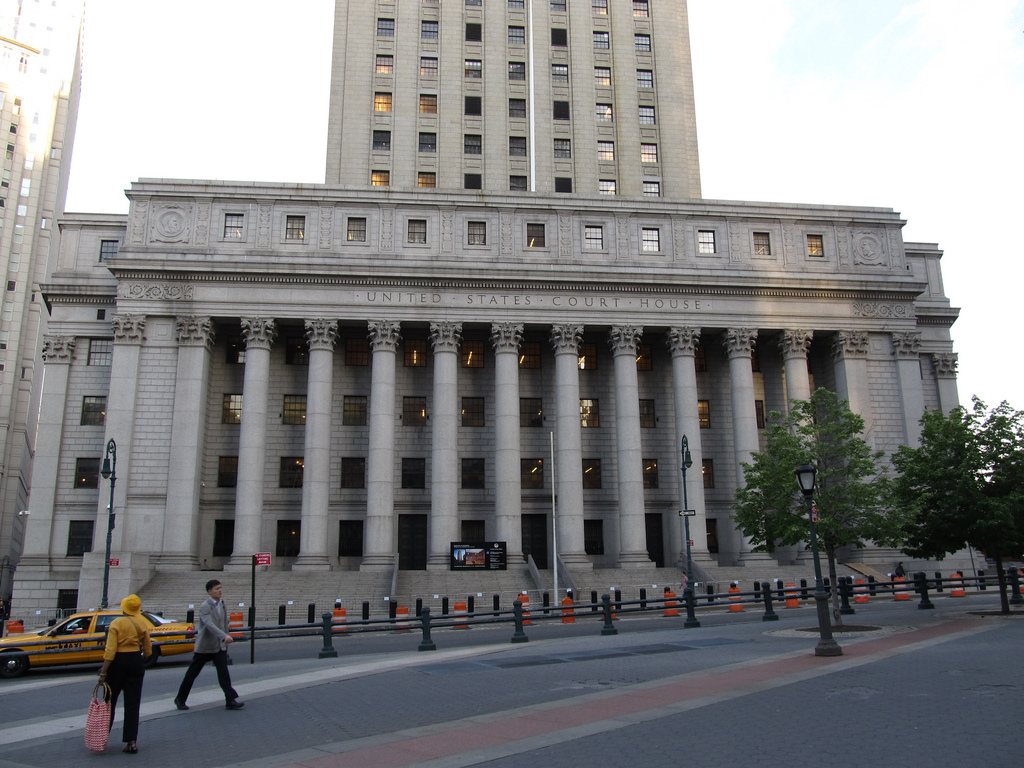What’s Really Going On in Constitution Pipeline v. New York State Department of Environmental Conservation
The interplay between the politics of a democracy and its laws can sometimes be sharply illuminated when a curtain is drawn back and the political motives behind the acts of state are revealed despite official disclaimers. That is what happened this week in the New York governor’s race, but to understand this—and its significance—requires some background.

Published by The Lawfare Institute
in Cooperation With

The interplay between the politics of a democracy and its laws can sometimes be sharply illuminated when a curtain is drawn back and the political motives behind the acts of state are revealed despite official disclaimers. That is what happened this week in the New York governor’s race, but to understand this—and its significance—requires some background.
In January of this year, I was part of a team that filed a petition for a writ of certiorari asking the U.S. Supreme Court to review a decision by the U.S. Court of Appeals for the Second Circuit, affirming an administrative decision by a New York state agency to deny a water quality permit to a natural gas pipeline otherwise approved by the Federal Energy Regulatory Commission. (Interested readers can find New York’s brief opposing a grant of certiorari here and our reply brief here.) The reason I was brought on—and the reason why this case may be of interest to Lawfare readers—has to do with the implications for U.S. national security of some rather dramatic economic developments.
Largely owing to breakthroughs in shale technology and the expansion of the U.S. pipeline network and export infrastructure, the U.S. has returned to the global natural gas markets as a producer and exporter for the first time in six decades. In 2017, the U.S. became a net exporter of natural gas for the first time in its history. Natural gas exports more than tripled from 2001 to 2011; indeed, natural gas exports absorbed almost all of the production growth from October 2016 to October 2017, according to the U.S. Energy Information Administration.
This development holds the promise of highly significant benefits to U.S. national security, in two respects. First, as a producer and exporter, the U.S. has the power to increase global supplies and thus lower prices—which is not only good for the global economy, but also bad for authoritarian states that depend upon energy earnings. For example, when the Senate in June 2017 passed legislation to strengthen U.S. sanctions against Russia, it adopted provisions to penalize investment in Russian energy export pipelines. This reflected an appreciation that, like a number of authoritarian states, Russia depends on raw material exports to subsidize an otherwise failing economy.
The breakeven rate for a given country—technically, the current account deficit minus the oil and gas trade surplus, divided by net oil and gas exports in barrels of oil equivalents—varies from state to state. Russia can balance its budget without increased taxation or budget cuts at about $35 per barrel equivalent. (As recently as 2013, it was $101 per barrel; the change since then largely owes to a 40 per cent collapse in the dollar value of Russian imports to the U.S., partly at least due to sanctions.) With the easing of sanctions, Iran has lowered its breakeven to $41. Venezuela has a breakeven price point of $78 per barrel. U.S. production of natural gas—and the infrastructure to deliver it to consumers and shippers—has become a crucial factor in driving down energy prices and thus putting pressure on authoritarian states as prices approach or go below a state’s breakeven point.
Second, and perhaps even more importantly, U.S. export capabilities strengthen our alliance structures and protect our allies and partners from extortion by Russia and Iran. As President of the European Council Donald Tusk put it in 2014, “Regardless of how the standoff over Ukraine develops, one lesson is clear: excessive dependence on Russian energy makes Europe weak.” Russian gas imports equaled 23 percent of total U.K. gas demand in 2016, 25 percent in France, and 62 percent in Germany. Beginning in 1991, Russia has pursued a strategy of coercion through price changes and supply cutoffs in at least 15 well-documented cases to pressure governments in Central and Eastern Europe and the former Soviet Union (though the true number of these instances is likely to be far higher). In 1993, for example, Russia successfully used a gas shutoff to pressure Ukraine to accept gas debt forgiveness in exchange for allowing Russia to retain most of its Black Sea naval fleet. More recently, Russia threatened to cut off energy supplies to Europe in order to quiet European criticism of Russia’s seizure of the Crimea and its support for Ukrainian separatists.
As one scholar put it, “Greater resilience undermines would-be regional hegemons who seek to use energy as a coercive tool against the United States and its allies by limiting their ability to control access to their energy resources.” The flaw in the U.S. energy-independence argument has always been that even if we were to achieve such independence, our allies would still require imported energy. For example, South Korea relies on imports for 98 percent of its fossil fuel consumption; Japan imports 82 percent of its energy. Japan and South Korea are, however, the top two largest importers of liquefied natural gas. So the new salience of arguments for U.S. energy independence is really that an energy-independent U.S. with export capabilities would be able to supply its allies.
All these developments are relevant to a case arising in the Second Circuit in which the New York Department of Environmental Conservation denied a water quality permit to a natural gas pipeline otherwise approved by the Federal Energy Regulatory Commission. This was accomplished by a rather simple sleight of hand. Instead of applying EPA-approved standards to determine whether a water permit should issue for a pipeline whose location had been designated by FERC, New York persuaded the court that so long as an alternative pipeline route existed that might be less harmful to the environment, a permit could be withheld. In its brief opposing a grant of certiorari, New York maintained that “[t]his case does not raise the national security and federalism concerns that [the pipeline] seeks to invoke. Nothing in FERC’s conditional certificate or rehearing order indicated that the agency considered [the] proposed pipeline to be necessary as a matter of national security.”
I’ll take up the federalism point in a moment, but first I should point out that the Natural Gas Act was designed to “provide a comprehensive national energy policy … to enhance the security of the United States and decrease dependence on foreign sources of fuel.” Of course the FERC certificate doesn’t repeat that; why would it? Your driver’s license doesn’t repeat the legislative purpose for registering drivers.
What is really going on in this case is a tactic—spreading to other states and other pipeline applications—of creating a state veto power over FERC-designated pipelines. New York has steadfastly maintained that this is not the case because it would be so manifestly contrary to the federal statutes at issue and for that reason unconstitutional under the supremacy clause. That claim is what makes this week’s disclosure so interesting.
The governor of New York is facing a strong primary challenge from a opponent who has sharply criticized his environmental record. In response to this, a spokesperson for the governor’s campaign on Friday said the governor has placed a moratorium on new natural gas pipelines in the state. On Monday, the campaign clarified that the governor has not approved any new pipelines.
But the governor has no authority to “place a moratorium”, nor indeed to refuse to “approve” new pipelines. This seems to concede that what is going on is the use of water quality permits to bring a halt to new pipeline construction even when the site has been approved by FERC—exposing the ruse to which we had objected.
Finally, as a constitutional law professor I can’t refrain from observing that the efforts by a state to frustrate the federal government’s national policies renew a struggle as old as the Marshall Court. Students who read McCulloch v. Maryland will ask, “If Maryland was getting substantial revenue from its tax on the federal bank, why did it oppose the constitutionality of the bank?” The answer of course is that Maryland sought to use the tax to destroy the bank, not to raise revenue. The tax was just a tactic by which Maryland could claim it was relying on its state powers.
The threat to interstate commerce presented by New York’s attempt at a veto is perhaps even more reminiscent of another first-year case, Gibbons v. Ogden. “Gibbons v. Ogden was the needed guarantee,” one scholar of Chief Justice John Marshall has observed, “that interstate rail, telephone and telegraph, oil and gas pipe lines might be built across state lines without the threat of local interference from state action.”
This apparently never-ending struggle has immense significance for the vitality of federal institutions without which any sensible national security policy cannot be sustained. New York’s effort to veto pipelines designated by FERC is not an abstract federalism concern: It directly implicates the federal government’s ability to address issues of concern to national security through energy policy. If states can simply bring pipeline construction to a halt—as officials in some states have pledged to do—the resulting loss of federal control over energy policy puts at risk the United States’ ability to deal with adversaries and support allies on the international stage.
I need hardly add that this is not a debate over the right mix of energy sources or the advisability of the use of natural gas to provide power. That debate will go on in Congress, where it must be continually reassessed and resolved.




